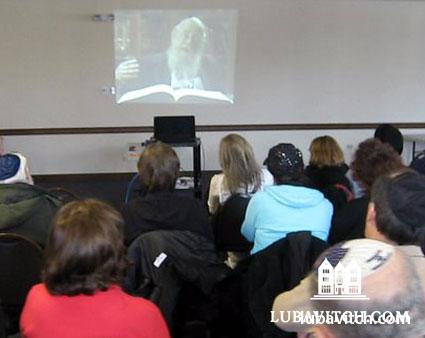(lubavitch.com) For all the blessings of the internet age—and they are enormous—this generation may spell the end of certain social conditions vital to the existential experience.
Tethered as we are to every hi-tech gizmo designed to keep us “in touch” with everyone everywhere at all times, we are rarely alone with ourselves, even when we are without another in the same space. At the very least, we have diminished aptitudes for genuine solitude and the introspection it breeds.
Neither have we–for all the amazing technologies designed to facilitate powerful communications–improved the quality of social togetherness. For even when we share the same space with others, the ring tones of our i-phones ensure that we are never fully in the same exclusive headspace with the other.
Against this backdrop the gift of Shabbos may have never been more profoundly needed, and more richly enjoyed than today, when, for a dedicated 25 hours out of every 7-day cycle, we disconnect from the technology designed to keep us connected, and revert to a more organic way of being, with ourselves, with others, with G-d.
I couldn’t help but think of this when listening to Rabbi Adin Steinsaltz’s presentation at the Unity Lecture. To hear him speak in real time, you had to have physically made your way to his center in Jerusalem, or be physically present at any of the 350 Chabad centers where hundreds of others convened to hear him over live video hook-up. There was no live internet feed. Deliberately.
According to Rabbi Efraim Mintz, “we wanted to capture the Hakhel experience,” where once in every 7 year cycle, the Jewish people arrived in body, to Jerusalem, to listen to the king teach. Sunday night’s event offered participants an approximation of that awesome convention.
Rabbi Steinsaltz explored the idea of Torah study as a comprehensive form of Jewish worship: its intellectual pursuit is often, necessarily, a solitary one, but it is also, ultimately part of a communal sharing of a common heritage. Taken as a whole, the Torah bears messages of universal significance, yet speaks to each of us, as individuals, in a manner of uniquely particularistic relevance. Through Torah study, we create the ladder to the human-Divine vertical connection, yet it is also the bridge to a horizontal, human-to-human bond.
In his talk, I discerned implicit themes that are so familiar to Judaism: the challenge always to negotiate opposites towards balanced harmony; the ideals of a spiritually and physically wholesome life that are within our grasp if only we learn to do so. The study of Torah in its highest form as an end itself, but for some of us lesser mortals, as a path towards a more genuinely thoughtful way of being, even in this age of extreme internet-connectedness. With ourselves, with others, with G-d.

Be the first to write a comment.